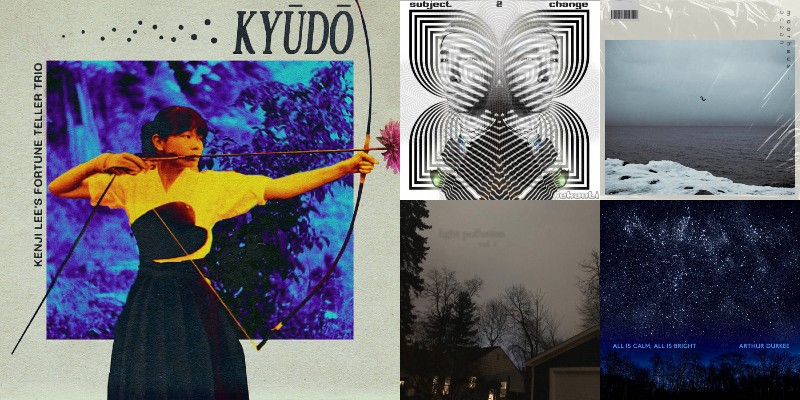Friday Five: Kenji Lee, Moorhaus, Ekanti, Othercast, Arthur Durkee

Friday Five highlights music by Washtenaw County-associated artists and labels.
This week features jazz from Kenji Lee's Fortune Teller Trio, indie-folk by Moorhaus, dance jams via Ekanti, dark-ambient by Othercast, and reinterpreted seasonal classics courtesy of Arthur Durkee.
Kenji Lee's Fortune Teller Trio, Kyūdō
Several years ago I saw the University of Michigan grad and now Ypsilanti-based tenor saxophonist Kenji Lee play a show, and I was knocked out by the ferocity of his playing. I wish I could tell you when and where that concert was, but even if my mind dumped the details, I was impressed enough by his performance that when I recognized Lee walking up Williams Street to Main Street last summer, I considered it a celebrity sighting (for Ann Arbor anyway). Lee's latest album, Kyūdō, is named after the meditative practice of traditional Japanese archery, and it features bassist Andy Peck and drummer Jonathan Barahal Taylor along with Estar Cohen's wordless guest vocals for three brief cuts. The saxophonist wrote 12 of the 16 tracks here, along with two originals by Peck as well as interpretations of Gustav Mahler's “Symphony No. 9 in D Major,” Ornette Coleman's “Chanting,” and “You Have Something Special” by singer-songwriter Joanna Sternberg. With no chordal instrument in the mix, the band has plenty of room to roam, creating a rumbling freedom that never descends into chaos. Geoff Brown recorded the album at the Russell Industrial Center in Detroit, and it sounds great—a very present, no-frills document of a tight group playing loosened music. Fellow U-M alum Brian Juarez is a bassist but he could be a writer, too: His liner notes for Kyūdō are terrific—as is Kenji Lee's Fortune Teller Trio. RIYL: the sax-bass-drum trios of Sonny Rollins, Joe Henderson, and Ornette Coleman.
Moorhaus, "Ocean" & "Help Me"
Beach Daisy guitarist-vocalist Zach Moorhaus stepped out on his own in 2022 with two lovely singles that retain the melodicism of his other (previous?) band but the arrangements are more stripped down and folky. The Ann Arbor-based Moorhaus claims Elliott Smith as a big influence, and you can hear that in these two acoustic-based songs.
Ekanti, "subject 2 change," "Way Too Long," and various mixes
Ekanti's Bandcamp page states he's been making or spinning tunes since 1999. But it seems like the Ann Arbor DJ and electronic-music producer spent most of the aughts becoming a Bhakti yoga master rather than cranking out dance-floor anthems such as "subject 2 change." He's also the person behind Vibe Upp, which hosts meditation and yoga sessions, sound baths, ecstatic dance events, and more. The mixes I found by him on YouTube feature everything from ambient and downtempo beats to house and reggae to get your spirit right. Meanwhile, "Way Too Long" is a bluesy guitar-and-bongos improv with vocals.
Othercast, light pollution vol. 1
Last August's Cult of the Circle Dance by Othercast—aka Ann Arbor's Kelman Wolfkostin—was a captivating 20-track concept album about a person who accesses a different world through ecstatic dancing in the woods. Conversely, the 16 brief cuts on light pollution vol. 1 have no deep story behind them: Othercast had collected these dark-ambient, industrial, and noise bits over the past couple of years and decided to put them together into an album. RIYL: Nurse With Wound, early Current 93.
Arthur Durkee, All Is Calm, All Is Bright
Once you're done listening to the new A Charlie Brown Christmas (Super Deluxe Edition), which features 80 tracks—who knew I needed 12 takes of "Greensleeves"?—throw on Arthur Durkee's All Is Calm, All Is Bright for even more great seasonal music. This Ann Arbor multi-instrumentalist simplifies things on this five-track EP and only plays an NS/Stick. It's a tapped string instrument that was introduced in 2000, but Durkee uses this modern device to play Medieval and Renaissance carols as well as one original, "Winter Starlight," and an interpretation of "Silent Night." Durkee minored in early music and ethnomusicology, which included studying Medieval English Christmas carols, but All Is Calm, All Is Bright was inspired not only by educational experience but also "the mystery of the deep midwinter time is one of stillness, of peace, of sleep," he writes on his Bandcamp page. "It is a late-night mood, when you are outdoors, bundled up warm, looking up at the midnight sky full of stars in their millions, bright enough to light the snowy land around you, midnight-blue and ice-silver. The air is crisp, clear, and cold, your breath frosts, and mist is over the lake. Everything is calm, the land and the very air are still."
Christopher Porter is a library technician and the editor of Pulp.


































